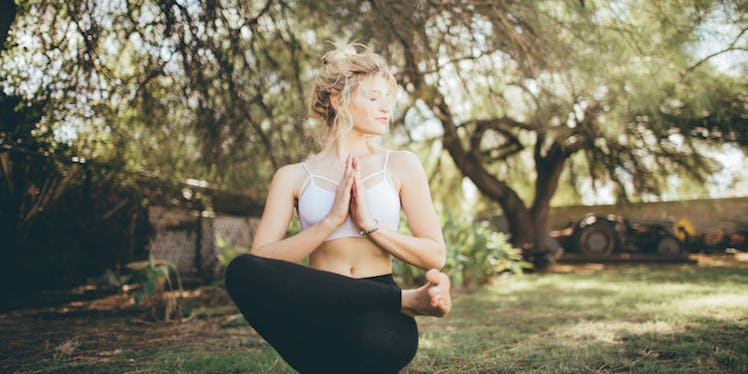
Why Meditation Has The Power To Make You Reevaluate Your Entire Life
Beginning in my later years of college, I found myself yearning to learn meditation. As many people will attest, meditation is an art that can be quite grueling to learn.
From its simplicity arises its complexity. Sitting in silence and focusing your mind on the present can be extremely profound and just as equally difficult.
The hardships I had endured through high school and early college left me with a brain that was always working overtime and a vast sea of thoughts that never ceased. As I continued on through life, struggling to grasp what meditation is and how to properly do it, I eventually left to pursue a masters degree at a medical school in Kansas City. As fate would have it, my anatomy professor was a Zen Buddhist who'd spent many years studying meditation and the teachings of ancient Zen monks.
Along with teaching us about the many muscles, bones and nerves in the human body, he held weekly group meditation for anyone interested to join. Naturally, I signed up as soon as I heard.
Before I knew it, I was a regular at his meditation sessions. What began as 20 minutes of sitting in silence evolved into over an hour of enlightenment every week. The things I learned would drastically change my life over the course of the school year.
Our teacher eventually introduced us to koans as a part our Zen training. Koans are ancient quotes, statements and short stories that originated in the Tang dynasty of ancient China. They were used by Chan Buddhist masters in the education of their students, as well as a way to challenge each other.
Not surprisingly, many koans are questions. One of the more common ones is, “What is the sound of one hand clapping?”
The beauty of koans is they can be profoundly meaningful or completely hollow. They take on a different meaning for each person and evolve with you over time.
Our teacher would give us a koan, we would meditate for nearly an hour and then we would discuss. Sometimes, we were stumped and sat in silence, staring at each other. Other times, what followed was an in-depth discussion as to how each of us had dissected the koan.
Most of the time, however, we spoke of how the koan was applicable to our lives, paradoxically through an elaborate circle of questions. Why is there one hand? Why is it clapping? Whose hand is it? Who is hearing the sound?
What we found was the more we questioned, the more we came to understand things on a deeper level. A koan of a few words that started out as a simple question was now a multi-faceted, complex puzzle challenging us to keep questioning.
Not surprisingly, we walked out of many sessions with our heads spinning and no concrete answer, yet our minds had been challenged to take on a whole new perspective, one that is applicable in all areas of life. Meditation (if practiced diligently) has the power to strip away the trivialities of life. It makes you realize how spastic your mind is, and it makes you question how much energy and emotion is lost to frivolous thoughts.
That was perhaps the most impactful lesson I took away from my year in meditation: Everything must be questioned. The amount of thoughts that pass through our brain on a daily basis amasses to hundreds, if not thousands, yet we rarely stop to question these thoughts and where they come from.
Similarly, we hear thousands of words and statements every day from dozens of people, yet we never think to question what they mean. We take in the world through our eyes and ears, unaware of how much is being integrated into our own identity.
If instead we treated life as a sea of koans, we could perhaps live more fulfilled lives. Learning to question what flows through our daily happenings could lead to a broader perspective in everything we do.
Question your thoughts, specifically the ones that are self-defeating and doubtful. Question the people who come into your life. Question why they stay or go.
Question the path you're on. Question why you've chosen a specific career. Question why certain obstacles appear in your life.
When life is going both good and bad, I've learned to cultivate the habit of asking myself, “What is life asking of me right now?”
When things are great, it reminds me to stay in the moment and enjoy because joyful moments can be fleeting. When life isn't going all too well, it allows me to zoom out and consider the bigger picture, often showing me that things aren't always as grim as we make them out to be.
I challenge you to start questioning many aspects of your life. If you do this enough, you start to realize how much time is spent on irrelevant things, and how it's much easier connecting all the aspects of your life looking back.
Questions allow you to challenge the negatives while appreciating the positives, whether they're thoughts, people or the circumstances you find yourself in. So, the next time you find yourself craving an answer, realize that perhaps the best answer to your question is another question.